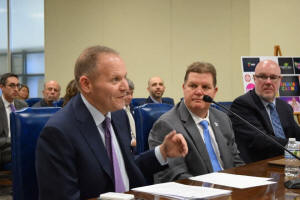Lawmakers mull betting on internet gambling while existing industry
warns it’ll fold
[March 15, 2025]
By Hannah Meisel
SPRINGFIELD — In the years since the COVID-19 pandemic temporarily shut
down Illinois casinos, video gambling terminals, horse racing and
professional sports — just days after legal sports betting went live —
the state’s gambling industry has seen an explosion in growth.
Even the state lottery, which was launched 50 years ago, has experienced
an expansion in recent years after a decade of stagnation. Total state
tax revenues from all sources of wagering in Illinois, including the
lottery, surpassed $2 billion in the last fiscal year.
Against this backdrop, some lawmakers are pushing for Illinois to join
eight other states that have legalized internet gambling, also known as
iGaming. It’s a tempting possibility in a year when the state is facing
a possible budget deficit and uncertainty about normally solid sources
of federal funding as President Donald Trump and congressional
Republicans are cheering for cuts.
While Illinois already allows sports betting on mobile apps, iGaming
includes online casinos and other forms of online gambling that are
currently outlawed.
State Rep. Edgar Gonzalez, D-Chicago, asked a panel of his fellow House
members this week to imagine Illinois facing another financial downturn
like the pandemic-recession of 2020 when Trump was finishing out his
first term. That year, Illinois faced a major budget shortfall, though
federal stimulus money ended up helping the state recover.
“If we had something like iGaming, we would have still had a financial
fallback in spite of gross negligence by the first Trump
administration,” he said Wednesday at a Capitol hearing on his proposal
to legalize internet gambling. “Illinois is gambling with its financial
future by delaying the adoption of iGaming.”
Proponents of Gonzalez’s House Bill 3080 point out that plenty of
Illinoisans are already gambling on the internet illegally, often
facilitated by overseas-based websites.
“Whether or not you choose to pass legislation legalizing iGaming, it is
already here,” James Hartmann, a lobbyist for sports betting giant
FanDuel, told the panel. “Right now, you can take out your phone and in
five minutes, be gambling real money slot machines from the app store,
unregulated and untaxed.”

Hartmann, who was heavily involved in drafting and negotiating Illinois’
legalized sports betting framework as a House Democratic staff attorney
in 2019, said iGaming sites are “flooding the Illinois market” — and
operating unscrupulously.
Meanwhile, FanDuel, Draft Kings and other sports betting platforms must
adhere to the law’s strict requirements for age checks, problem gambling
prevention notifications and other consumer protections to maintain
their expensive licenses.
“And so while these bad actors profit, none of it is being captured in
tax revenue for the state of Illinois,” Hartmann said.
He and others pushing the iGaming bill claim Illinois could collect an
additional $1 billion annually in taxes on internet gambling. The
estimate is extrapolated from a 2024 report commissioned by the Sports
Betting Alliance, an industry group that represents the four biggest
sportsbooks in the U.S.
Those mobile sports betting platforms, which operate in 31 states,
Puerto Rico and Washington, D.C., are eager to expand their nascent
iGaming business into more states. The Sports Betting Alliance has been
running geotargeted social media ads urging iGaming legalization in
recent weeks, not just in Illinois but also Maryland.
The analysis from the gambling industry consultancy firm Eilers &
Krejcik estimated $775 million in state tax revenues after five years of
legalized iGaming at a nearly 25% tax rate. The $1 billion figure would
reflect a higher tax rate more in line with what larger casinos and
sports books pay, especially after a hike in the state’s sports betting
tax last year. Pritzker last month also floated a tax hike on casino
table games to help fill the state’s budget gap.
But opponents of legalizing iGaming — including some casinos, video
gambling terminal operators and the hospitality groups that represent
the bars and restaurants in which those VGTs have proliferated in the 13
years since video gambling’s launch in Illinois — warn the introduction
of iGaming would prove a zero-sum game.
Indeed, the General Assembly’s fiscal forecasting arm has for years
reported on the cannibalization effects that new gambling opportunities
have on existing gambling outlets. In its annual study from October, the
legislature’s Commission on Government Forecasting and Accountability
continued to chronicle the downfall of Illinois’ once-thriving horse
racing industry, in addition to noting flagging revenues from the
state’s legacy riverboat casinos, the oldest of which have been in
business for a little more than three decades.
While overall casino revenue in Illinois is up, that success is mainly
attributable to the opening of six new casinos provided for under
Illinois’ massive 2019 gambling expansion law. Additionally, Rivers
Casino in Des Plaines, Illinois’ first land-based casino that opened in
2011, has also seen continued growth.
But the state’s nine legacy riverboat casinos have seen their revenues
decline “for nine consecutive years,” according to the report. Visits to
casinos in East St. Louis, East Peoria and Joliet’s Harrah’s Casino have
seen significant drop-off. Many of those casinos would be even worse off
if it weren’t for sportsbook partnerships entered into during the thick
of the pandemic, when the type of in-person betting that was provided
for under the law was not allowed.
The Illinois Gaming Board opposes the bill due to the agency’s own
struggles to keep up with its existing regulatory responsibilities and
the General Assembly’s lack of motion on banning so-called “sweepstakes
machines,” which are similar to video gambling terminals but operate in
a legal gray area.

Jay Keller, a contract lobbyist for Penn Entertainment Inc., noted the
company has spent $600 million in recent years enhancing and expanding
its casinos in Aurora, Joliet and Alton — an investment “made with the
understanding that Illinois’ gaming landscape would remain stable,” he
told lawmakers.
[to top of second column]
|

Jeremy Kudon, president of the Sports Betting Alliance, testifies in
front of the Illinois House Gaming Committee in Springfield this
week in favor of legalizing internet gambling, also known as iGaming.
Sportsbooks like FanDuel and DraftKings are eager to expand their
nascent iGaming business into more states and claim Illinois could
see a revenue windfall from the industry. But opposition is stiff.
(Capitol News Illinois photo by Jade Aubrey)

“The economic impact of iGaming is uncertain, but the potential negative
consequences are clear: The proliferation of online gaming could reduce
in-person casino traffic, threatening jobs, lowering the economic
benefits to local communities and ultimately discouraging future
investments in the state,” he said.
Penn also operates video gambling terminals throughout Illinois and
sportsbooks at all three of its casinos, including mobile sports betting
via the casino in Aurora. Keller noted that roughly half of Illinois
casinos are on Penn’s side opposing iGaming, while the other half are in
favor of legalizing it.
Though one major labor union, the Chicago-based International
Brotherhood of Electrical Workers Local 134, supports legalizing iGaming,
another influential union is opposed.
Marc Poulos, the executive director of the labor-management group for
the International Union of Operating Engineers Local 150, warned against
any move that might jeopardize funding for state infrastructure
projects, which provide jobs for Local 150 members.
“Every study that we have looked at shows that iGaming would cannibalize
existing gaming positions, mainly video gaming terminals,” he told the
panel.
A study published last month, commissioned by the National Association
Against iGaming, warned that if Illinois legalizes internet gambling,
the state could lose $252.5 million in direct casino tax revenues and
4,733 jobs, taking into account the gambling industry’s adjacent
hospitality industry.
Though the study concluded that land-based casinos underperformed
expected growth in states where iGaming has been legalized, internet
gambling proponents disagree.
“iGaming brings new customers to casinos,” Sports Betting Alliance
President Jeremy Kudon told lawmakers, saying the threat of
cannibalization has become a mythical “Loch Ness Monster.”
Another report the Sports Betting Alliance commissioned last year found
that of Illinois survey respondents who participated in either illegal
iGaming or placed online bets while traveling to a state where it’s
legal, 23% said they visited casinos more after they began iGaming.
However, 54% said the frequency of their casino visits stayed the same,
while 19% said they didn’t go as much.
Additionally, Michael Pollock of the New Jersey-based consultancy firm
Spectrum Gaming Group said “two immutable laws of human nature” will
still attract people to casinos.
“One is that people like games of chance, and two is that people enjoy
being in social settings,” he said.
Trevor Hayes, an executive with Caesars Sportsbook, which operates in
partnership with Elgin’s Grand Victoria Casino, agreed, saying his
company has found iGaming is “actually a marketing tool” for
brick-and-mortar casinos to “find new customers – younger customers.”
But that’s exactly what some opponents worry will happen, creating a new
class of problem gamblers.

A Tulchin Research survey published this week of 800 Illinois voters
last month found 71% believed online gambling is more addictive than
betting at casinos or other brick-and-mortar establishments.
Seventy-seven percent of survey respondents agreed with the sentiment
that “lawmakers should look for better ways to balance the state budget
than expanding mobile gambling in Illinois.”
The October report from the legislature’s economic forecasting
commission estimated that in the last five fiscal years, the per-capita
amount spent on gambling and lottery tickets in Illinois has increased
from $325 to $560 annually, driven primarily by the explosion of video
gambling terminals in Illinois and sports betting.
Illinois’ sports betting market is now second in the nation behind New
York in terms of overall sportsbook revenue, according to a report
published last month by the American Gaming Association.
And Illinois’ video gambling terminal industry is far and away the
largest of any state with legal VGTs; a whopping 48,176 machines were in
operation at bars, restaurants, dedicated gaming cafes, truck stops and
the state fairgrounds in Springfield as of the end of last fiscal year
in June.
Ivan Fernandez, director of the Illinois Gaming Machine Operators
Association, which represents the VGT industry, warned that, unlike
video gambling and casinos, iGaming presents a more dangerous risk of
addiction. He urged lawmakers to follow other states that have rejected
bids for iGaming legalization in recent years.
“They declined to authorize putting online casino gambling at people’s
fingertips on millions of cellphones, tablets and computers available 24
hours a day, seven days a week, when people are most vulnerable,” he
said. “When they’re alone or in isolation and within the close reach of
minors, without regard for local authority or any reasonable time or
spending limits.”
This week’s hearing yielded no vote, as it was purely informational, but
the House Gaming Committee’s chair, state Rep. Dan Didech, D-Buffalo
Grove, indicated there would be a long road ahead for any iGaming
legalization bid, calling opponents’ concerns “well-founded.”
Capitol News Illinois is
a nonprofit, nonpartisan news service that distributes state government
coverage to hundreds of news outlets statewide. It is funded primarily
by the Illinois Press Foundation and the Robert R. McCormick Foundation. |